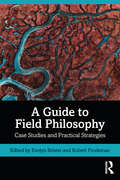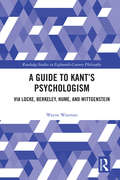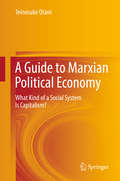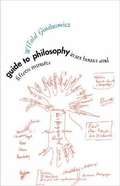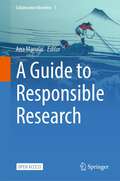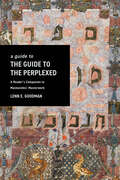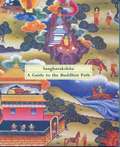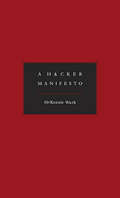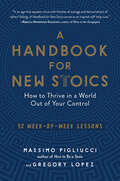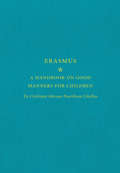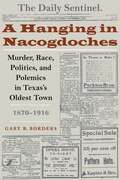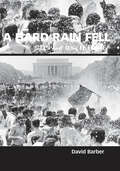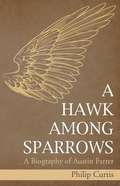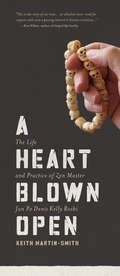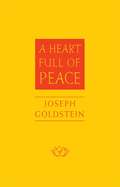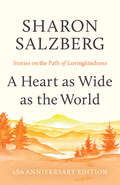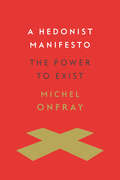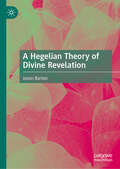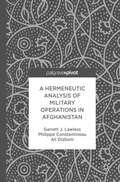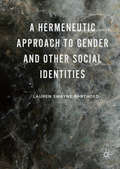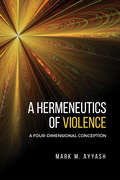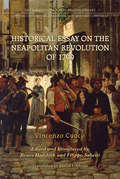- Table View
- List View
A Guide to Field Philosophy: Case Studies and Practical Strategies
by Robert Frodeman Evelyn BristerPhilosophers increasingly engage in practical work with other disciplines and the world at large. This volume draws together the lessons learned from this work—including philosophers’ contributions to scientific research projects, consultations on matters of policy, and expertise provided to government agencies and non-profits—on how to effectively practice philosophy. Its 22 case studies are organized into five sections: I Collaboration and Communication II Policymaking and the Public Sphere III Fieldwork in the Academy IV Fieldwork in the Professions V Changing Philosophical Practice Together, these essays provide a practical, how-to guide for doing philosophy in the field—how to find problems that can benefit from philosophical contributions, effectively collaborate with other professionals and community members, make fieldwork a positive part of a philosophical career, and anticipate and negotiate the sorts of unanticipated problems that crop up in direct public engagement. Key features: Gives specific advice on how to integrate philosophy with outside groups. Offers examples from working with the public and private sectors, community organizations, and academic groups. Provides lessons learned, often summarized at the end of chapters, for how to practice philosophy in the field.
A Guide to Kant’s Psychologism: via Locke, Berkeley, Hume, and Wittgenstein (Routledge Studies in Eighteenth-Century Philosophy)
by Wayne WaxmanThis book presents an interpretation of Kant’s Critique of Pure Reason as a priori psychologism. It groups Kant’s philosophy together with those of the British empiricists—Locke, Berkeley, and Hume—in a single line of psychologistic succession and offers a clear explanation of how Kant’s psychologism differs from psychology and idealism. The book reconciles Kant’s philosophy with subsequent developments in science and mathematics, including post-Fregean mathematical logic, non-Euclidean geometry, and both relativity and quantum theory. It also relates Kant’s psychologism to Wittgenstein’s later conception of language. Finally, the author reveals the ways in which Kant’s philosophy dovetails with contemporary scientific theorizing about the natural phenomenon of consciousness and its place in nature. This book will be of interest to Kant scholars and historians of philosophy working on the British empiricists.
A Guide to Marxian Political Economy: What Kind Of A Social System Is Capitalism?
by Teinosuke OtaniThis textbook offers a comprehensive guide to the systematic structure of capitalism, while at the same time introducing readers to all three volumes of Marx’s Capital. Based on his extensive expertise on Marx’s critique of political economy, the author reveals the specific structure of production in capitalist societies and explicates what sets this system apart from other modes of production. Marx’s political economy is explained in a systematic and easy-to-understand manner, using numerous illustrative diagrams to complement the text. This textbook will appeal to all students and scholars looking for a more comprehensive, systematic and theoretical explanation of capitalism, equipping them with a solid theoretical understanding of its core structure.
A Guide to NIP Theories
by Pierre SimonThe study of NIP theories has received much attention from model theorists in the last decade, fuelled by applications to o-minimal structures and valued fields. This book, the first to be written on NIP theories, is an introduction to the subject that will appeal to anyone interested in model theory: graduate students and researchers in the field, as well as those in nearby areas such as combinatorics and algebraic geometry. Without dwelling on any one particular topic, it covers all of the basic notions and gives the reader the tools needed to pursue research in this area. An effort has been made in each chapter to give a concise and elegant path to the main results and to stress the most useful ideas. Particular emphasis is put on honest definitions, handling of indiscernible sequences and measures. The relevant material from other fields of mathematics is made accessible to the logician.
A Guide to Philosophy in Six Hours and Fifteen Minutes
by Witold Gombrowicz Benjamin IvryWitold Gombrowicz (1904-1969), novelist, essayist, and playwright, was one of the most important Polish writers of the twentieth century. A candidate for the Nobel Prize in Literature in 1968, he was described by Milan Kundera as "one of the great novelists of our century" and by John Updike as "one of the profoundest of the late moderns. " Gombrowicz's works were considered scandalous and subversive by the ruling powers in Poland and were banned for nearly forty years. He spent his last years in France teaching philosophy; this book is a series of reflections based on his lectures. Gombrowicz discusses Kant, Hegel, Schopenhauer, Kierkegaard, Sartre, and Heidegger in six "one-hour" essays and addresses Marxism in a shorter "fifteen-minute" piece. The text-a small literary gem full of sardonic wit, brilliant insights, and provocative criticism-constructs the philosophical lineage of his work.
A Guide to Responsible Research (Collaborative Bioethics #1)
by Ana MarušićThis Open Access book is a guide to good, responsible research at each step of the process of research discovery, so that a researcher at the beginning of a scientific career has a clear pathway to doing good research and producing reliable results.The textbook will give context to the practices described in the European Code of Conduct for Research Integrity, guided by the fundamental principles or research integrity – reliability, honesty, respect, and accountability. Although we base the book on the European Code, the principles are the same in the global research community, such as those outlined in Fostering Integrity in Research from the US National Academies; Engineering and Medicine. The chapters in the book follow good research practices, give practical advice and address basic principles. In this way, the book is applicable to different research fields. It directs readers to various sources for further and updated information, particularly drawing from the resources available at The Embassy of Good Science, the European platform for research integrity and ethics.
A Guide to The Guide to the Perplexed: A Reader’s Companion to Maimonides’ Masterwork
by Lenn GoodmanIn this volume, noted philosopher Lenn E. Goodman shares the insights gained over a lifetime of pondering the meaning and purpose of Maimonides' celebrated Guide to the Perplexed. Written in the late twelfth century, Maimonides' Guide aims to help religiously committed readers who are alive to the challenges posed by reason and the natural sciences to biblical and rabbinic tradition. Keyed to the new translation and commentary by Lenn E. Goodman and Phillip I. Lieberman, this volume follows Maimonides' life and learning and delves into the text of the Guide, clearly explaining just what Maimonides means by identifying the Talmudic Ma'aseh Bereshit and Ma'aseh Merkavah with physics and metaphysics (to Maimonides, biblical cosmology and theology). Exploring Maimonides' treatments of revelation, religious practice and experience, law and ritual, the problem of evil, and the rational purposes of the commandments, this guide to the Guide explains the tactics Maimonides deployed to ensure that readers not get in over their heads when venturing into philosophical deep waters.
A Guide to the Buddhist Path
by SangharakshitaAn accessible and enlightening introduction to the basics of Buddhism, based on the numerous lectures given by Sangharakshita. This edition is of the corrected, second edition.
A Hacker Manifesto
by McKenzie WarkA double is haunting the world—the double of abstraction, the virtual reality of information, programming or poetry, math or music, curves or colorings upon which the fortunes of states and armies, companies and communities now depend. The bold aim of this book is to make manifest the origins, purpose, and interests of the emerging class responsible for making this new world—for producing the new concepts, new perceptions, and new sensations out of the stuff of raw data. A Hacker Manifesto deftly defines the fraught territory between the ever more strident demands by drug and media companies for protection of their patents and copyrights and the pervasive popular culture of file sharing and pirating. This vexed ground, the realm of so-called “intellectual property,” gives rise to a whole new kind of class conflict, one that pits the creators of information—the hacker class of researchers and authors, artists and biologists, chemists and musicians, philosophers and programmers—against a possessing class who would monopolize what the hacker produces. Drawing in equal measure on Guy Debord and Gilles Deleuze, A Hacker Manifesto offers a systematic restatement of Marxist thought for the age of cyberspace and globalization. In the widespread revolt against commodified information, McKenzie Wark sees a utopian promise, beyond the property form, and a new progressive class, the hacker class, who voice a shared interest in a new information commons.
A Handbook for New Stoics: How To Thrive In A World Out Of Your Control--52 Week-by-week Lessons
by Massimo Pigliucci Gregory LopezA pragmatic philosophy more popular than ever—here are 52 ancient lessons to help you overcome adversity and find tranquility in the modern world Stress often comes from situations that are beyond our control—such as preparing for a meeting, waiting for test results, or arguing with a loved one. But we can control our response to these everyday tensions—through the wisdom and practice of Stoicism. Stoicism is an ancient pragmatic philosophy that teaches us to step back, gain perspective, and act with intention. In A Handbook for New Stoics, renowned philosopher Massimo Pigliucci and seasoned practitioner Gregory Lopez provide 52 week-by-week lessons to help us apply timeless Stoic teachings to modern life. Whether you’re already familiar with Seneca and Marcus Aurelius, or you’re entirely new to Stoicism, this handbook will help you embrace challenges, thrive under pressure, and discover the good life!
A Handbook of Wisdom
by Jennifer Jordan Robert J. SternbergAt a time when poor choices are being made by notably intelligent and powerful individuals, this book analyzes a form of reasoning and decision-making that is not only productive and prudent, but serves as well a beneficial purpose for society. A Handbook of Wisdom includes contributions from some of the most prominent scholars in the field of wisdom research. Written from multiple perspectives, including psychology, philosophy, and religion, this book gives the reader an in-depth understanding of wisdom's past, present, and possible future direction within literature, science, and society.
A Handbook on Good Manners for Children: De Civilitate Morum Puerilium Libellus
by ErasmusWhen did you last tell your children to put their hand over their mouth when they yawn? When did you last suggest that when they are introduced to someone they should shake hands firmly and look them in the eye? Do you suggest that they should wait until everyone is served before they eat rather than hoover up the best bit for themselves? Do you demand that your young daughter dress decorously lest she elicit outraged looks? Do you think that the children of today have disgraceful manners? Unlike, of course, when you were young ... Well, that's certainly what Erasmus of Rotterdam thought in 1530 when he published De Civilitate Morum Puerilium: A Handbook on Good Manners for Children. He felt that learning good manners was crucial to a child's upbringing, and that the uncouth and ill-disciplined behaviour around him demanded a new kind of book. After all, as William of Wykeham memorably said in the 1350s, 'Manners maketh man'. A Handbook on Good Manners for Children is considered to be the first treatise in Western Europe on the moral and practical education of children. It was a massive bestseller - indeed the biggest-selling book of the sixteenth century - going into 130 editions over 300 years and being translated into 22 languages within ten years of its publication. In it, Erasmus concerns himself with matters such as how to dress, how to behave at table, how to converse with one's elders and contemporaries, how to address the opposite sex and much else. For example: Table Manners 'It's just as rude to lick greasy fingers as it is to wipe them on your clothing, Use a cloth or napkin instead.''Some people, no sooner than they've sat down, immediately stick their hands into the dishes of food. This is the manner of wolves.' 'Making a raucous noise or shrieking intentionally when you sneeze, or showing off by carrying on sneezing on purpose, is very ill-mannered.''To fidget around in your seat, and to settle first on one buttock and then the next, gives the impression that you are repeatedly farting, or trying to fart.' The advice is as relevant today as it was 500 years ago.
A Hanging in Nacogdoches: Murder, Race, Politics, and Polemics in Texas's Oldest Town, 1870-1916
by Gary B. BordersOn October 17, 1902, in Nacogdoches, Texas, a black man named James Buchanan was tried without representation, condemned, and executed for the murder of a white family--all in the course of three hours.<P><P> Two white men played pivotal roles in these events: Bill Haltom, a leading local Democrat and the editor of the Nacogdoches Sentinel, who condemned lynching but defended lynch mobs, and A. J. Spradley, a Populist sheriff who, with the aid of hundreds of state militiamen, barely managed to keep the mob from burning Buchanan alive, only to escort him to the gallows following his abbreviated trial. Each man's story serves to illuminate a part of the path that led to the terrible parody of justice which lies at the heart of A Hanging in Nacogdoches.
A Hard Rain Fell: SDS and Why it Failed
by David BarberBy the spring of 1969, Students for a Democratic Society (SDS) had reached its zenith as the largest, most radical movement of white youth in American history—a genuine New Left. Yet less than a year later, SDS splintered into warring factions and ceased to exist. SDS's development and its dissolution grew directly out of the organization's relations with the black freedom movement, the movement against the Vietnam War, and the newly emerging struggle for women's liberation. For a moment, young white people could comprehend their world in new and revolutionary ways. But New Leftists did not respond as a tabula rasa. On the contrary, these young people's consciousnesses, their culture, their identities had arisen out of a history which, for hundreds of years, had privileged white over black, men over women, and America over the rest of the world. Such a history could not help but distort the vision and practice of these activists, good intentions notwithstanding. A Hard Rain Fell: SDS and Why It Failed traces these activists in their relation to other movements and demonstrates that the New Left's dissolution flowed directly from SDS's failure to break with traditional American notions of race, sex, and empire.
A Hawk Among Sparrows: A Biography Of Austin Farrer
by Philip CurtisThis biography of Austin Farrer, written with the cooperation of the trustees of the Farrer estate, presents a lively portrait of the man and his life and assesses his contribution as philosopher, biblical scholar, and divine. As Fellow and Chaplain of Trinity College, Oxford, and later Warden of Keble College, Oxford, Farrer broke new ground with his unorthodox approach to biblical criticism and won honor as a philosopher of religion with such works as Finite and Infinite. This biography includes extensive correspondence between Farrer and his father, a Baptist minister and theological college lecturer. These letters vividly illustrate Farrer's cast of mind and distinctive views while demonstrating the integrity and creativity of his relationships with family and friends.
A Heart Blown Open
by Keith Martin-SmithA Heart Blown Open chronicles the extraordinary journey of Zen master Jun Po Denis Kelly Roshi, whose life landed him in prison long before he landed in a monastery. Experience the successes and failures that led him to found an entirely new form of Buddhism called Mondo Zen. Starting from an abusive and alcoholic home in Wisconsin, Kelly becomes a major force in the counterculture of the 1960s and one of its biggest manufacturers of LSD. He ends up on the run for five years before serving time in a federal prison, and then goes on to spend six years in a Zen monastery. In his fiftieth year, he becomes a recognized Zen master in his own right, but the real journey is just about to begin. Extraordinary in their playfulness, depravity, and liberating insight, Jun Po's life events swirl together to underscore and illuminate the environment from which one of the most controversial masters of the American Zen scene has emerged. A Heart Blown Open constitutes a powerful synthesis of Eastern contemplative wisdom and Western psychological insight and is as entertaining as it is inspirational.Winner of the 2013 Silver Award for Excellence from Nautilus Book Awards.
A Heart Full of Peace
by His Holiness the Dalai Lama Joseph GoldsteinLove, compassion, and peace - these words are at the heart of all spiritual endeavors. Although we intuitively resonate with their meaning and value, for most of us, the challenge is how to embody what we know: how to transform these words into a vibrant, living practice. In these times of conflict and uncertainty, this transformation is far more than an abstract ideal; it is an urgent necessity. Peace in the world begins with us. This wonderfully appealing offering from one the most trusted elders of Buddhism in the West is a warm and engaging exploration of the ways we can cultivate and manifest peace as wise and skillful action in the world. This charming book is illuminated throughout with lively, joyous, and sometimes even funny citations from a host of contemporary and ancient sources - from the poetry of W.S. Merwin and Galway Kinnell to the haiku of Issa and the great poet-monk Ryokan, from the luminous aspirations of Saint Francis of Assisi to the sage advice of Thich Nhat Hanh and the Dalai Lama.
A Heart as Wide as the World: Stories on the Path of Lovingkindness
by Sharon SalzbergThe beloved Buddhist meditation teacher and New York Times–bestselling author of Real Happiness offers encouragement and inspiration for anyone on the spiritual pathBuddhist teachings have the power to transform our lives for the better, says Sharon Salzberg, and all we need to bring about this transformation can be found in the ordinary events of our everyday experiences. In A Heart as Wide as the World, Salzberg distills more than twenty-five years of teaching and practicing meditation into a series of short essays, rich with anecdotes and personal revelations, that offer genuine aid and comfort for anyone on the spiritual path. Many chance moments, both small and profound, serve as the basis for Salzberg's teachings: hearing a market stall hawker calling, &“I have what you need!&”; noting hotel guests&’ reactions to a midnight fire alarm; watching her teacher, Dipa Ma, bless a belligerent dog; seeing the Dalai Lama laughing uproariously at his own mistake. Each passing moment, Salzberg shows, can help us down the path toward &“a seamlessness of connection and an unbounded heart.&”
A Hedonist Manifesto
by Michel Onfray Joseph McclellanMichael Onfray passionately defends the potential of hedonism to resolve the dislocations and disconnections of our melancholy age. In a sweeping survey of history's engagement with and rejection of the body, he exposes the sterile conventions that prevent us from realizing a more immediate, ethical, and embodied life. He then lays the groundwork for both a radical and constructive politics of the body that adds to debates over morality, equality, sexual relations, and social engagement, demonstrating how philosophy, and not just modern scientism, can contribute to a humanistic ethics. Onfray attacks Platonic idealism and its manifestation in Judaic, Christian, and Islamic belief. He warns of the lure of attachment to the purportedly eternal, immutable truths of idealism, which detracts from the immediacy of the world and our bodily existence. Insisting that philosophy is a practice that operates in the real, material world, Onfray enlists Epicurus and Democritus to undermine idealist and theological metaphysics; Nietzsche, Bentham, and Mill to dismantle idealist ethics; and Palante and Bourdieu to collapse crypto-fascist neoliberalism. In their place, he constructs a positive, hedonistic ethics that enlarges on the work of the New Atheists to promote a joyful approach to our lives in this, our only, world.
A Hedonist Manifesto: The Power to Exist (Insurrections: Critical Studies in Religion, Politics, and Culture)
by Michel OnfrayMichael Onfray passionately defends the potential of hedonism to resolve the dislocations and disconnections of our melancholy age. In a sweeping survey of history's engagement with and rejection of the body, he exposes the sterile conventions that prevent us from realizing a more immediate, ethical, and embodied life. He then lays the groundwork for both a radical and constructive politics of the body that adds to debates over morality, equality, sexual relations, and social engagement, demonstrating how philosophy, and not just modern scientism, can contribute to a humanistic ethics.Onfray attacks Platonic idealism and its manifestation in Judaic, Christian, and Islamic belief. He warns of the lure of attachment to the purportedly eternal, immutable truths of idealism, which detracts from the immediacy of the world and our bodily existence. Insisting that philosophy is a practice that operates in a real, material space, Onfray enlists Epicurus and Democritus to undermine idealist and theological metaphysics; Nietzsche, Bentham, and Mill to dismantle idealist ethics; and Palante and Bourdieu to collapse crypto-fascist neoliberalism. In their place, he constructs a positive, hedonistic ethics that enlarges on the work of the New Atheists to promote a joyful approach to our lives in this, our only, world.
A Hegelian Theory of Divine Revelation
by Jason BartonThis book explores what G.W.F. Hegel meant by &‘God&’. Was he referring to the Lutheran conception of the Christian God? Or, was he referring to a heterodox conception of God more in line with his philosophical speculations? Through a close reading of Hegel&’s Lectures on the Philosophy of Religion, this book offers a detailed answer to this question. It contends that Hegel assigns two meanings to the concept of God: an inward-facing perspective and an outward-facing perspective. From the inward-facing perspective, Hegel ventured to authentically capture how world-historical religions respectively portray the divine from their own conceptual, representational, and practical positions. From the outward-facing perspective, Hegel identifies divinity with absolute spirit in its odyssey-like movement toward self-recognition. The concept of God for Hegel encompasses both of these meanings. It is argued that one cannot approximate an accurate comprehension of Hegel&’s &‘God&’ without analyzing divine revelation. In contrast to previous books, this book firmly grounds Hegel&’s religious phenomenology in historical and logical factors. Through such a grounding, A Hegelian Theory of Divine Revelation attempts to achieve a clarified understanding of the character of Hegelian divine revelation and ultimately a clarified understanding of Hegel&’s concept of God. This book is essential reading for all scholars and researchers of German idealism and of the philosophy of religion, especially those focusing on the thought of G.W.F. Hegel.
A Hermeneutic Analysis of Military Operations in Afghanistan
by Garrett J. Lawless Philippe Constantineau Ali DizboniThis book introduces the field of hermeneutics through a critique of military operations in Afghanistan. Following a brief survey of modern political history of the country, the authors examine the link between cultural factors and the inefficiency of nation-building operations. Additionally, the project discusses contending academic approaches to culture, and identifies shortcomings in their theoretical propositions for military operations in failed states. Ultimately, this volume contextualizes the evolution of hermeneutical thinking and the benefits it provides in assessing the transformation of culture through military intervention.
A Hermeneutic Approach to Gender and Other Social Identities
by Lauren Swayne BartholdThis book draws on the hermeneutics of Hans-Georg Gadamer to inform a feminist perspective of social identities. Lauren Swayne Barthold moves beyond answers that either defend the objective nature of identities or dismiss their significance altogether. Building on the work of both hermeneutic and non-hermeneutic feminist theorists of identity, she asserts the relevance of concepts like horizon, coherence, dialogue, play, application, and festival for developing a theory of identity. This volume argues that as intersubjective interpretations, social identities are vital ways of fostering meaning and connection with others. Barthold also demonstrates how a hermeneutic approach to social identities can provide critiques of and resistance to identity-based oppression.
A Hermeneutics of Violence: A Four-Dimensional Conception
by Mark M. AyyashAttention to the elusiveness of violence opens up a rich landscape of analysis, whereby social scientists can examine the often-overlooked transformative dimensions of violent acts. Theories of violence are numerous today, but because of the mysterious nature of violence, and how each individual or group may endure it uniquely, its study cannot be limited to one specialized and highly restricted field. A Hermeneutics of Violence seeks to remedy this problem by placing in dialogue various theories of violence from the disciplines of anthropology, sociology, international relations, and philosophy. This study uses a four-dimensional lens to examine the many facets of violence, including its instrumental, linguistic, mimetic, and transcendental dimensions. Far from irreconcilable, these positions, when placed within a four-dimensional outlook, open up new avenues for the study of particular cases of violence. Exploring the complex interactions, for instance, of "enemy-siblings," Mark M. Ayyash reveals "postures of incommensurability" that continuously produce conflictual positions across a spectrum of time and space and demand the release of violence. The book concludes that these postures must be understood and deconstructed before we can have a legitimate chance to achieve peace and justice, the conceptions of which must come with the intent of not necessarily opposing violence but rather replacing our conceptions of what the violences have come to constitute as "real."
A Historical Essay on the Neapolitan Revolution of 1799
by Bruce Haddock David Gibbons Vincenzo Cuoco Filippo SabettiDeeply influenced by Enlightenment writers from Naples and France, Vincenzo Cuoco (1770-1823) was forced into exile for his involvement in the failed Neapolitan revolution of 1799. Living in Milan, he wrote what became one of the nineteenth century's most important treatises on political revolution.In his Historical Essay on the Neapolitan Revolution of 1799, Cuoco synthesized the work of Machiavelli, Vico, and Enlightenment philosophers to offer an explanation for why and how revolutions succeed or fail. A major influence on political thought during the unification of Italy, the Historical Essay was also an inspiration to twentieth-century thinkers such as Benedetto Croce and Antonio Gramsci.This critical edition, featuring an authoritative translation, introduction, and annotations, finally makes Cuoco's work fully accessible to an English-speaking audience.
